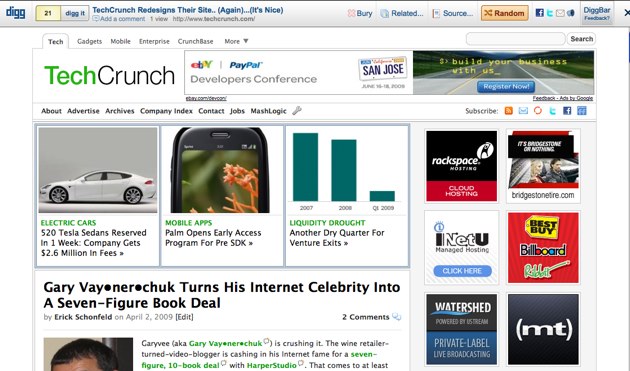
Those changes to the DiggBar that we noted on Sunday are, apparently, permanent. We expect Digg to make an announcement about those changes later today.
We first heard about the DiggBar in February, and the product launched in April. At that time Digg was calling it a short URL service, meaning users could convert long URLs into short ones that are better suited to services like Twitter and Facebook. Unlike other services, Digg kept their own toolbar at the top of the page with Digg stats on the story as well. The underlying URL was shown in an iframe.
Some sites weren’t pleased to have their content framed around Digg stats and blocked the service. Digg capitulated and did a full redirect for non-logged in users, so people who don’t use Digg were simply sent to the underlying site. Everyone seemed happy with the service from that point on.
Except Digg, it seems. The tool was no longer sending new users to the Digg.com site, since those users didn’t see the Digg wrapper when they clicked on the URL. The changes noted last Sunday reversed how non-Digg users were treated. Instead of a redirect to the original URL they are sent to the Digg story about that URL. Effectively a bait and switch.
Digg founder Kevin Rose, fresh back from vacation, wasn’t aware of the change to the service. He Twittered out links to some pictures using the DiggBar link and was surprised to see the story auto-submitted to Digg. He followed up asking people to bury the story, and then Twittered once more saying he “was not aware” of the change. And then just to add to the confusion, he Twittered yet again that he did know of the change, he just didn’t know when it was being rolled out.
DiggBar is no longer going to be described as a URL shortening service, we’ve heard, and Digg intends to make these new changes permanent. We’ve also heard that they will treat old links created with the DiggBar under the old rules to avoid being accused of hijacking that traffic to their own site.
These changes aren’t all that meaningful on their own. But it does show that Digg isn’t interested in competing with Bit.ly and other services that are seeing massive data flows from useful URL shortening services. The fact that Bit.ly intends to compete head on with Digg via those data flows isn’t non-trivial. Two days ago I predicted Digg would realize this and quickly reverse the policy changes. But I was wrong. Digg does fully realize the competitive landscape. But it seems they don’t care to compete in the short URL space. Instead, they are going to grab the short term traffic benefits from redirecting these URLs to their home page.
That seems shortsighted to me, and it is certainly not the best user experience. But Digg is clearly looking to become profitable this year. Sometimes the users suffer somewhat as tough choices are made.